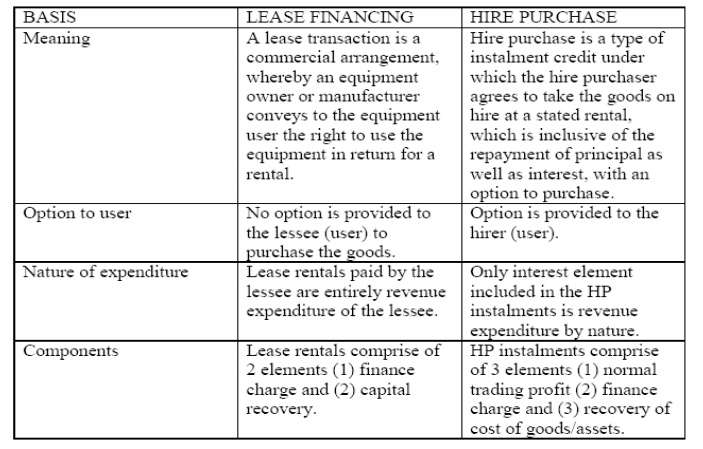Chapter: Business Science : Financial Management : Long Term Sources of Finance
Hire purchase
Hire Purchase:
1 Introduction
2 Features
3 Hire Purchase Agreement
4 Difference between leasing and hire-purchase
Hire purchase
1Introduction
Hire
purchase is a mode of financing the price of the goods to be sold on a future
date. In a hire purchase transaction, the goods are let on hire, the purchase
price is to be paid in installments and hirer is allowed an option to purchase
the goods by paying all the installments. Hire purchase is a method of selling
goods. In a hire purchase transaction the goods are let out on hire by a
finance company (creditor) to the hire purchase customer (hirer). The buyer is
required to pay an agreed amount in periodical installments during a given
period. The ownership of the property remains with creditor and passes on to
hirer on the payment of the last installment.
A hire
purchase agreement is defined in the Hire Purchase Act,
1972 as
peculiar kind of transaction in which the goods are let on hire with an option
to the hirer to purchase them, with the following stipulations :
a. Payments
to be made in installments over a specified period.
b. The
possession is delivered to the hirer at the time of entering into the contract.
c. The
property in goods passes to the hirer on payment of the last installment.
d. Each
installment is treated as hire charges so that if default is made in payment of
any installment, the seller becomes entitled to take away the goods, and
e. The
hirer/ purchase is free to return the goods without being required to pay any
further installments falling due after the return.
2 Features
v Under
hire purchase system, the buyer takes possession of goods immediately and
agrees to pay the total hire purchase price in installments.
v Each
installment is treated as hire charges.
v The
ownership of the goods passes from the seller to the buyer on the payment of
the last installment.
v In case
the buyer makes any default in the payment of any installment the seller has
right to repossess the goods from the buyer and forfeit the amount already
received treating it as hire charges.
v The hirer
has the right to terminate the agreement any time before the property passes.
That is, he has the option to return the goods in which case he need not pay
installments falling due thereafter. However, he cannot recover the sums
already paid as such sums legally represent hire charges on the goods in
question.
3 Hire Purchase
Agreement
1.Nature of Agree ment: Stating
the nature, term and commencement of the
agreement.
2.Delivery of Equipment: The place
and time of delivery and the hirer‘s liability to bear delivery charges.
3.
Location:
The place
where the equipment shall be kept during the period of hire.
4. Inspection: That the hirer has examined the
equipment and is satisfied with it.
5.Repairs: The hirer to obtain at his cost,
insurance on the equipment and to hand over
the insurance policies to the owner.
6.Alteration:
The hirer not to make any alterations, additions and so on to the equipment,
without prior consent of the owner.
7. Termination: The events or acts of hirer that
would constitute a default eligible to
terminate the agreement.
8.
Risk: of loss
and damages to be borne by the hirer.
9.Registration and fees: The hirer
to comply with the relevant laws, obtain registration and bear all requisite fees.
10. Indemnity clause: The
clause as per Contract Act, to indemnify the lender.
11. Stamp duty: Clause specifying the stamp duty
liability to be borne by the hirer.
12. Schedule: of equipments forming subject
matter of agreement.
13. Schedule of hire charges.
The
agreement is usually accompanied by a promissory note signed by the hirer for
the full amount payable under the agreement including the interest and finance
charges.
4 DIFFERENCE BETWEEN LEASING AND HIRE-PURCHASE

Related Topics